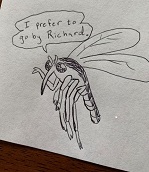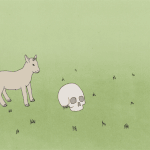|
Handsome Ralph posted:Everything Amazon sells and ships directly will still be sold and shipped. If they have something in stock right now, they'll still likely ship it out to you. It's the "Sold by X and fulfilled by Amazon" stuff that is getting temporarily halted. My company sells very little through amazon but they do order and we tend to get an order once a week. Amazon let us know not to expect much and only if they run out and there is a demand would they order more until this situation is under control. They did not specify how they determine demand, I assume people looking at the page or clicking tell me when it's in stock.
|
|
|
|

|
| # ? May 28, 2024 01:44 |
|
I rarely ever drink these days (think the last time I had whiskey was like a month ago?) but I feel compelled to hit up the liquor store to get a few bottles.
|
|
|
|
Shaocaholica posted:I stocked up on bats and pangolins before the got banned. Enjoy your pangolin titty milk.
|
|
|
|
Hopper posted:Regarding lasting changes in society, now would be the ideal time to take all the money allocated to bail out companies and instead pay a universal income of 1000€ (or equivalent as appropriate per country) to everyone. the bodies aren't even cold yet, how about you take your lovely unproven socialist pipe dreams and go somewhere else where they might be appreciated (USER WAS PUT ON PROBATION FOR THIS POST)
|
|
|
|
Amazon isn't shutting down, they're clearing their distribution centers of anything that isn't groceries and toiletries.
|
|
|
|
Blorange posted:Amazon isn't shutting down, they're clearing their distribution centers of anything that isn't groceries and toiletries. Please let me know when they slash prices on their 1kg package of ladybugs.
|
|
|
|
Blorange posted:Amazon isn't shutting down, they're clearing their distribution centers of anything that isn't groceries and toiletries. And even then its only certain warehouses where this is true. Not all of them are equipped to store this stuff.
|
|
|
|
I just thought of a job for wayward entertainment/food services workers. While places still accept cash as a form of payment, everyone can strip down to their skivvies and count cash like in drug movies. Just gotta add a sterilization room.
|
|
|
|
Louisgod posted:I rarely ever drink these days (think the last time I had whiskey was like a month ago?) but I feel compelled to hit up the liquor store to get a few bottles.  I don't really drink either but as a hurricane veteran I know it's critical for any slow-burning disaster
|
|
|
|
All the theater chains in my area are closed except for one small chain, which are refusing to even cut attendance to 50% because “they believe access to entertainment is important in times like these” or some poo poo. Naturally people are flocking to them and I’m sure nothing bad will come of it
|
|
|
|
Mnoba posted:the bodies aren't even cold yet, how about you take your lovely unproven socialist pipe dreams and go somewhere else where they might be appreciated gently caress you. gently caress you. gently caress you.
|
|
|
|
WEH posted:All the theater chains in my area are closed except for one small chain, which are refusing to even cut attendance to 50% because “they believe access to entertainment is important in times like these” or some poo poo. Naturally people are flocking to them and I’m sure nothing bad will come of it If your state government made a mandate about banning gatherings of certain group sizes you should seriously consider alerting your local police and/or health department. While the folks flouting the social distancing measures going there deserve to get it, the other people they may come into contact with do not.
|
|
|
|
Day Man posted:gently caress you. gently caress you. gently caress you. No absolutely not
|
|
|
|
frogge posted:If your state government made a mandate about banning gatherings of certain group sizes you should seriously consider alerting your local police and/or health department. While the folks flouting the social distancing measures going there deserve to get it, the other people they may come into contact with do not. ya, i have a bad feeling people are going to try flaunting this and not be aware of our already aggressive police force. I'm assuming they train for eventualities like this but really, it would be a part i would snooze through.
|
|
|
|
My cousin posted something about our 94yo Icelandic grandmother's experiences with pandemics over the years.quote:In her long life, Nana remembers many examples of self-quarantine and medical isolation.
|
|
|
|
poverty goat posted:
Yesterday I saw a guy walking down the street with a box of Coronas. All I could think about was that I'm down to my last 4 bottles.
|
|
|
|
Disco Pope posted:Do we get to skip one in 2021 since we're on our second? No. Pay attention, that other thing was extra credit only. hofnar fucked around with this message at 20:06 on Mar 17, 2020 |
|
|
|
Ornamental Dingbat posted:100,000! WE DID IT BABY! 11 days ago. Looks like we'll hit 200,000 in the next day.
|
|
|
|
What if pango titty milk is really sweet and tasty
|
|
|
|
I said come in! posted:No, you'll probably be asked to help patients who might have COVID-19. I just do purchasing, so the most they can ask me to do is more purchasing. Born on a mountain, raised in a cave, buying medical products at deeply discounted prices is all I crave. (plus fuckin' and/or truckin')
|
|
|
|
sweet thursday posted:What if pango titty milk is really sweet and tasty when he got covid but he still suckin
|
|
|
|
Ornamental Dingbat posted:11 days ago. Looks like we'll hit 200,000 in the next day. That yellow line is, uh, sure something these days.
|
|
|
|
Fingers crossed Gamestop finally goes under from all this because holy gently caress are they being more terrible than usual (surprise) https://twitter.com/patrickklepek/status/1239979342052155399
|
|
|
|
so um.. I just had a thought. Kony seems prety close to Roni Continue to your normal shitposting.
|
|
|
|
Had an emergency Skype meeting for all our therapy clinics in chicago, and were told "we still need to serve people, even those that aren't immediately post op so practice social distancing, we are staying open full hours". When asked how to social distance when we often are 1 to 2 feet from our patients and we often have more than a dozen people in the gym at a time, we were told "just figure it out, if they bring kids tell them to leave them outside in the car."
|
|
|
|
imagine the upcoming deep discounts on estate sale corvettes
|
|
|
|
I miss hanging out with groups of adults. That was an easy way to charge my emotional battery. Now that I can't do it, I'm expecting to get depression one of these days. At least I have goons to talk to.
|
|
|
|
 quote:In Cornwall, 79-year-old Dulcie Williams will meet her son, grandson and great-granddaughter for a cream tea on Wednesday. “I haven’t yet decided if I will keep to full self-isolation,” she said. “I might well find that life is no longer worth living if I can’t see my loved ones. I hear what the government are saying that that’s a decision for me to take when the time comes.” https://www.theguardian.com/world/2020/mar/17/uk-families-meet-up-before-expected-lockdown-for-over-70s
|
|
|
|
Well, Belgium is going in some sort of lockdown. Only allowed outside to buy food/see doctor or work. Groups of people other than families are no longer allowed. I hope people don't loose their poo poo in supermarkets tomorrow.
|
|
|
|
One of my great-great-aunts has distant memories of the 1918 pandemic when she was 4, I should give her a call
|
|
|
|
numberoneposter posted:imagine the upcoming deep discounts on estate sale corvettes good news is they've never gone above 65 so you have a nice fresh engine.
|
|
|
|
https://www.cnn.com/2020/03/17/us/kentucky-refused-quarantine-coronavirus-trnd/index.html MUH FREEDOMS
|
|
|
|
The original version of this image had the company's phone number on it. I bet they've had an interesting day.
|
|
|
|
^^ lots of 1 star reviews from march for some reason. edit: FB page, Linkedin page also deleted for some reason. stab posted:https://www.cnn.com/2020/03/17/us/kentucky-refused-quarantine-coronavirus-trnd/index.html people like this deserve death panels that will be coming due to bamma care Plz dont probe me.
|
|
|
|
Update on vaccine development: https://www.theguardian.com/world/2020/mar/17/when-will-a-coronavirus-vaccine-be-ready When will a coronavirus vaccine be ready? quote:Even at their most effective – and draconian – containment strategies have only slowed the spread of the respiratory disease Covid-19. With the World Health Organization finally declaring a pandemic, all eyes have turned to the prospect of a vaccine, because only a vaccine can prevent people from getting sick.
|
|
|
|
Frank Frank posted:The original version of this image had the company's phone number on it. I bet they've had an interesting day. Their Facebook, Linked in and review site pages are all down, and if you type their name into google it auto-fills "corona virus" at the end. The are done
|
|
|
|
Drunk Nerds posted:I miss hanging out with groups of adults. That was an easy way to charge my emotional battery. Now that I can't do it, I'm expecting to get depression one of these days. Lol take care of yourself bro.
|
|
|
|
mrfart posted:Well, Belgium is going in some sort of lockdown. I also heard that Belgian universities came up with a weird Russian trick to do much more testing than today. It's apparently a much simpler but slower method that was described in the 80ies by some Russian scientist. Requires less complex equipment and reagents , just more work, but that's not where the bottleneck is currently Perfect exemple of Belgian pragmatism
|
|
|
|
Adolf Glitter posted:Their Facebook, Linked in and review site pages are all down, and if you type their name into google it auto-fills "corona virus" at the end. The 10th google result is the owner's email and phone contact info. lol
|
|
|
|

|
| # ? May 28, 2024 01:44 |
|
I live in an urban uptown neighborhood with a large 20-30s population who work in service industries. Talked with a few at the corner liquor/deli earlier. Its pretty grim.
|
|
|

























































